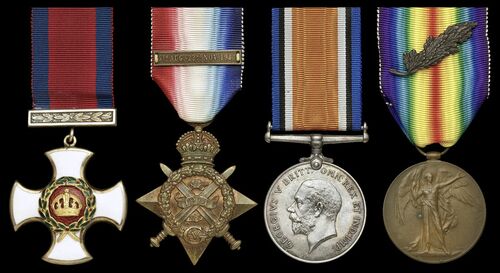
Auction: 23003 - Orders, Decorations and Medals
Lot: 259
A 'Great War 1918' D.S.O. group to Lieutenant Colonel W. E. Williams, Middlesex Regiment, attached 10th Battalion, Cheshire Regiment, who was taken a Prisoner of War at the Catacombs, Hyde Park Corner on 11 April 1918
Distinguished Service Order, G.V.R., silver-gilt and enamel; 1914 Star, clasp (Lieut: W. E. Williams. Midd'x R.); British War and Victory Medals, with M.I.D. oak leaves (Lt. Col W.E. Williams.), extremely fine (4)
D.S.O. London Gazette 16 September 1918:
'For conspicuous gallantry and devotion to duty. Under very heavy artillery and machine-gun fire, he reorganised his battalion, got in touch with troops on either side, and successfully held his position.'
M.I.D. London Gazette 24 May & 28 December 1918.
Walter Ellis Williams was born at Fulham, London on 6 August 1884 and appointed 2nd Lieutenant in the Militia on 7 November 1903. Transferring to the 6th Battalion, Middlesex Regiment as Second Lieutenant on 27 May 1908. Ordered to join the West Africa Frontier Force on 13 July 1910 he was to serve there for three years, temporaruly as Captaon on 1 April 1911. Rejoining his Regiment on 4 May 1913 Williams served as a Lieutenant with the Middlesex Regiment, stationed at Raglan Barracks, Devonport, Devon.
Entering the war in France on 13 August 1914 with the 4th Battalion, Middlesex Regiment. Promoted Major on 7 September 1916 he was later appointed Brigade Major with the Institute of Senior Officers School on 16 October 1916. Further advanced Lieutenant-Colonel with the 10th Battalion Cheshire Regiment on 28 September 1917, it was with them that he was awarded the Distinguished Service Order.
Leading the Battalion during the German Spring Offensive at the Catacombs feature in the Hyde Park Corner sector on 11 April 1918 his position was overrun. Williams went 'in the bag' and remained as such until 29 November 1918, when he was repatriated.
With the end of the Great War, Williams remained in the military, however his life appears to have taken a downturn. He initiated a divorce in 1920 having discovered that his wife was having an affair, one which she had begun immediately before their marriage in 1913 and carried on throughout the Great War. Unsurprisingly, Williams appears to have needed a fresh start which he achieved by emigrating to Canada. Settling in New Westminster, British Colombia, his exertions during the conflict caught up with him. He died on 29 September 1924, aged just 40.
Subject to 20% VAT on Buyer’s Premium. For more information please view Terms and Conditions for Buyers.
Sold for
£1,500
Starting price
£1100




